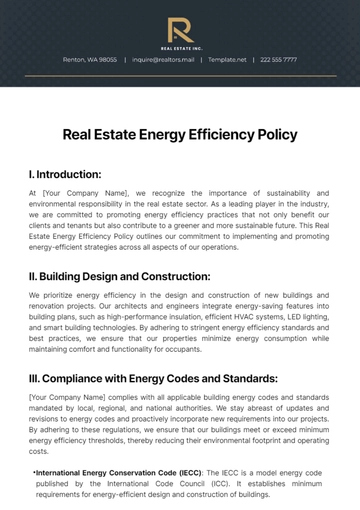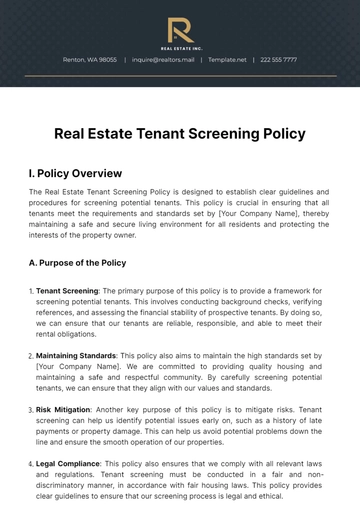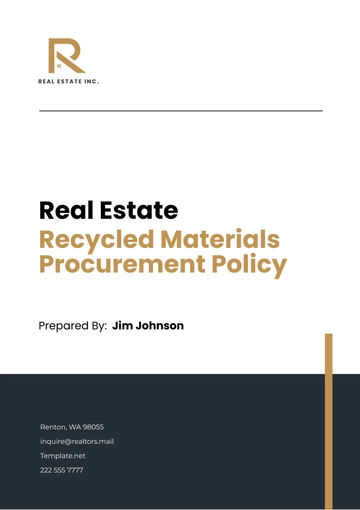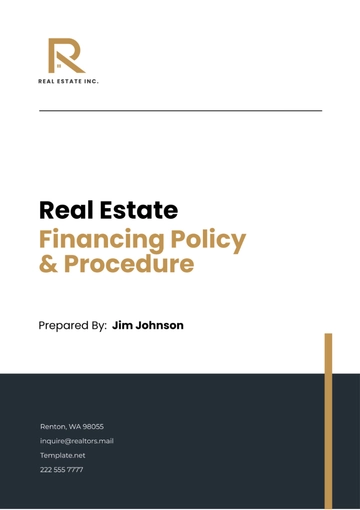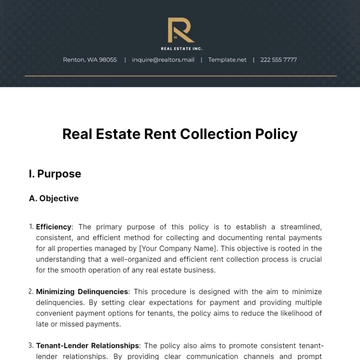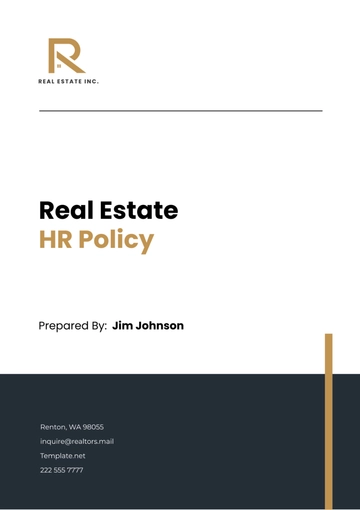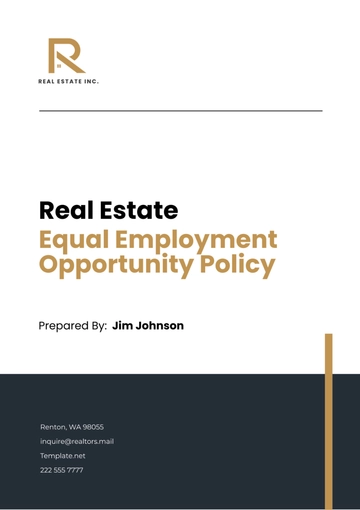Free Real Estate Recycled Materials Procurement Policy
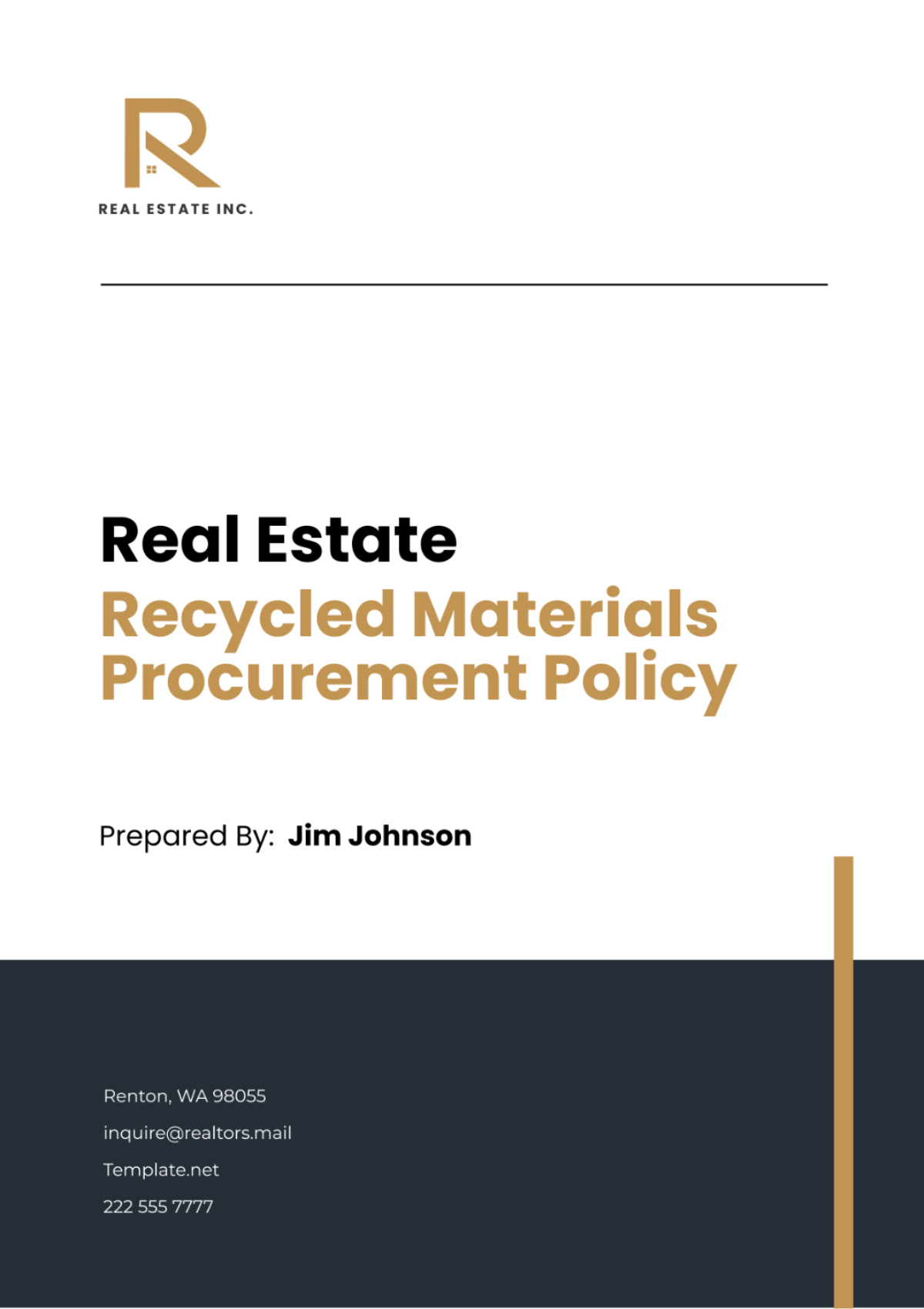
I. Policy Statement
A. Purpose
Promotion of Recycled Materials: The primary purpose of this policy is to promote the use of recycled materials in our real estate projects. This not only helps in reducing waste but also contributes to the conservation of natural resources.
Demonstration of Commitment: Through this policy, we aim to demonstrate our commitment to sustainable development. We believe that by using recycled materials, we can make a significant contribution to environmental preservation.
Reduction of Environmental Impact: The policy is also intended to reduce the environmental impact of our construction and renovation projects. By using recycled materials, we can minimize the demand for new materials, thereby reducing the strain on our planet’s resources.
B. Commitment
Sourcing and Utilization: We commit to sourcing and utilizing recycled materials wherever possible. This commitment extends to all stages of our projects, from planning and design to construction and maintenance.
Continuous Improvement: We commit to continuously improving our procurement processes to increase the use of recycled materials. We will regularly review and update our practices to ensure they remain effective and efficient.
Compliance with Laws and Regulations: We commit to complying with all relevant environmental laws and regulations. We understand the importance of legal compliance in maintaining our reputation and ensuring the success of our projects.
II. Scope
This policy applies to all employees, contractors, and partners of [Your Company Name] involved in procurement, construction, project management activities related to our real estate projects.
A. Employees
Employee Support: All employees are expected to support the implementation of this policy. Their cooperation is crucial in ensuring the successful execution of our commitment to using recycled materials.
Responsibilities: Employees involved in procurement and project management have specific responsibilities under this policy. They are expected to make decisions that align with our commitment to using recycled materials.
Training: Training will be provided to relevant employees to ensure they understand and can effectively implement this policy. This training will cover the importance of using recycled materials, the procurement process, and techniques for ensuring project quality and safety.
B. Contractors and Partners
Compliance: All contractors and partners are required to comply with this policy. We expect them to share our commitment to using recycled materials and to adhere to our procurement practices.
Support: Contractors and partners are expected to support our commitment to using recycled materials. We will work closely with them to identify opportunities to increase the use of recycled materials in our projects.
Opportunities for Increased Use: We will work with our contractors and partners to identify opportunities to increase the use of recycled materials. This collaborative approach will help us maximize the environmental benefits of our projects.
III. Policy Guidelines
A. Identification of Recycled Materials
Our team will work relentlessly to identify potential recycled materials that are safe, sustainable, and adequate for use. Every effort will be made to ensure the maximum amount of materials for each project is obtained from recycled sources. Here are the steps:
Material Identification: It involves a thorough research process to identify potential recycled materials that can be used in our real estate projects. This step is crucial as it sets the foundation for the rest of the process. It involves collaboration with suppliers, research institutions, and industry experts to stay abreast of the latest developments in recycled materials.
Safety Assessment: It is a critical step to ensure that the identified materials pose no risk to our employees, contractors, or the end-users of our properties. We adhere to strict safety standards and any material that does not meet these standards is not considered for use in our projects.
Sustainability Evaluation: It involves assessing the environmental impact of the identified materials. We consider the entire lifecycle of the material, from production to disposal, to ensure that it aligns with our commitment to environmental sustainability.
Adequacy Check: It is about ensuring that the identified materials are suitable for our projects. We consider factors such as durability, aesthetics, and functionality. The materials we use need to not only be recycled but also high-quality and fit for purpose.
Maximizing Use: It is about making every effort to use as much recycled material in each project as possible. This involves exploring innovative ways to incorporate recycled materials into our designs and constantly looking for opportunities to increase our use of recycled materials.
B. Supplier Selection
We will prioritize suppliers who demonstrate a commitment to environmental sustainability and can provide high-quality recycled materials. Suppliers will also be evaluated based on their waste management and recycling practices. The following table outlines the key criteria for supplier selection:
Criteria | Description |
|---|---|
Environmental Commitment | The supplier’s commitment to environmental sustainability. |
Quality of Materials | The quality of the recycled materials provided by the supplier. |
Waste Management Practices | The supplier’s practices for managing and recycling waste. |
Compliance with Regulations | The supplier’s compliance with relevant environmental laws and regulations. |
Reliability | The reliability of the supplier in terms of delivery schedules and service. |
Let’s delve deeper into each criterion:
Environmental Commitment: It involves assessing the supplier’s commitment to environmental sustainability. This can be gauged through their policies, practices, and initiatives aimed at reducing their environmental impact. Suppliers who demonstrate a strong commitment to environmental sustainability are likely to provide high-quality recycled materials and be reliable partners in our efforts to promote sustainable development.
Quality of Materials: It is about evaluating the quality of the recycled materials provided by the supplier. We need to ensure that the materials are not only recycled but also of high quality and suitable for use in our real estate projects. This involves assessing the durability, functionality, and aesthetics of the materials.
Waste Management Practices: It involves evaluating the supplier’s practices for managing and recycling waste. Suppliers who have effective waste management practices are more likely to provide high-quality recycled materials. This is because good waste management practices often involve processes that preserve the quality of materials during recycling.
Compliance with Regulations: It is about ensuring that the supplier complies with all relevant environmental laws and regulations. Compliance is a key indicator of a supplier’s commitment to environmental sustainability and their reliability as a business partner.
Reliability: It involves assessing the reliability of the supplier in terms of delivery schedules and service. We need to ensure that our suppliers can deliver the required materials on time and provide good service. This is crucial for the smooth execution of our real estate projects.
The process of supplier selection is a critical aspect of our policy. By choosing suppliers who meet these criteria, we can ensure that we are sourcing high-quality recycled materials and promoting sustainable practices in the industry. This not only helps us achieve our environmental goals but also enhances our reputation as a responsible and sustainable company.
Furthermore, by setting clear criteria for supplier selection, we can encourage suppliers to improve their practices. This can lead to industry-wide improvements in the quality of recycled materials and waste management practices. Therefore, our supplier selection process is not only beneficial for our company but also contributes to broader environmental sustainability efforts.
C. Quality Assurance
While we aim to use recycled materials as much as possible, the quality of these materials should not be compromised. All utilized recycled materials must adhere to the industry’s standards and guidelines for safety and durability. The following outlines the key steps in the process of ensuring quality assurance:
Material Testing: It involves conducting rigorous testing of the recycled materials to ensure they meet our quality standards. This is a critical step in our quality assurance process. We need to ensure that the recycled materials we use are not only environmentally friendly but also of high quality and suitable for use in our real estate projects.
Compliance with Standards: It is about ensuring that all recycled materials comply with industry standards and guidelines. This is crucial for maintaining the safety and durability of our properties. We will not compromise on the quality of our materials, even as we strive to increase our use of recycled materials.
Regular Audits: It involves conducting regular audits to ensure ongoing compliance with our quality standards. These audits will help us identify any issues early and take corrective action. They will also provide us with valuable insights into our performance and help us continuously improve our practices.
Supplier Evaluation: It is about regularly evaluating our suppliers to ensure they continue to provide high-quality recycled materials. This is an important part of our quality assurance process. By regularly evaluating our suppliers, we can ensure that we are working with partners who share our commitment to quality.
Continuous Improvement: It is about continually improving our quality assurance processes based on feedback and learnings. We believe in the importance of continuous improvement and are always looking for ways to enhance our practices and deliver better results.
Quality assurance is a critical aspect of our policy. By ensuring the quality of the recycled materials we use, we can deliver high-quality properties that meet the expectations of our customers and stakeholders. This not only helps us achieve our environmental goals but also enhances our reputation as a provider of high-quality real estate.
Moreover, by setting high standards for quality and regularly auditing our performance, we can drive continuous improvement in our practices. This can lead to improvements in the quality of recycled materials available in the market and promote the wider adoption of these materials in the industry. Therefore, our quality assurance process is not only beneficial for our company but also contributes to broader environmental sustainability efforts.
D. Training
All responsible personnel will be trained and educated about the significance of using recycled materials, the procurement process, and techniques for ensuring project quality and safety. The following table outlines the key training programs that we will implement:
Training Program | Description | Frequency |
|---|---|---|
Introduction to Recycled Materials | This program will provide an overview of recycled materials and their importance in sustainable development. | Annually |
Procurement Process | This program will cover the process of procuring recycled materials, including supplier selection and quality assurance. | Biannually |
Quality and Safety Techniques | This program will teach techniques for ensuring the quality and safety of recycled materials. | Quarterly |
Policy Awareness | This program will ensure that all personnel are aware of our policy and understand their responsibilities. | Annually |
Continuous Improvement | This program will focus on continuous improvement and innovation in the use of recycled materials. | Biannually |
Training is a critical aspect of our policy. By providing comprehensive training to our personnel, we can ensure that they have the knowledge and skills necessary to effectively implement our policy. This not only helps us achieve our environmental goals but also enhances our reputation as a responsible and sustainable company.
Additionally, by investing in training, we can drive continuous improvement in our practices. This can lead to improvements in the quality of recycled materials available in the market and promote the wider adoption of these materials in the industry. Therefore, our training programs are not only beneficial for our company but also contribute to broader environmental sustainability efforts.
IV. Reporting
All activities related to the procurement and use of recycled construction materials must be recorded and reported to the company’s Sustainability Officer or equivalent role for monitoring and continuous policy improvement.
A. Record Keeping
Maintaining Detailed Records: It is crucial to maintain detailed records of all procurement activities related to recycled materials. These records will serve as a valuable resource for tracking our progress and identifying areas for improvement.
1.1. Documentation: All procurement activities, including supplier negotiations, purchase orders, and receipts, should be thoroughly documented. This will ensure transparency and accountability in our procurement processes.
1.2. Database Management: We will maintain a database of all recycled materials procured, including details about the suppliers, cost, quantity, and project associated with each procurement. This centralized database will facilitate easy access to information and enable efficient decision-making.
1.3. Accessibility: These records should be easily accessible for review and audit purposes. This will ensure that we are able to monitor compliance with this policy and take corrective action if necessary.
Recording Types and Quantities: We will record the types and quantities of recycled materials used in each project. This information will help us understand our usage patterns and make more informed procurement decisions in the future.
2.1. Material Tracking: We will track the types and quantities of recycled materials used in each project, which will help us identify trends and make future procurement decisions. This will also enable us to measure the impact of our policy on the use of recycled materials.
2.2. Project Reports: Each project will have a final report detailing the use of recycled materials, which will be used for future planning and strategy development. These reports will provide valuable insights into the effectiveness of our policy.
2.3. Waste Management: We will also record the amount of waste generated and how much of it was recycled or disposed of responsibly. This will help us monitor our waste management practices and identify opportunities for improvement.
Training Records: We will keep records of all training and education provided to employees. This will allow us to ensure that all relevant personnel are adequately trained and to identify any gaps in our training program.
3.1. Training Sessions: Records of all training sessions, including dates, attendees, and topics covered, will be maintained. This will enable us to monitor the effectiveness of our training program and make necessary adjustments.
3.2. Employee Progress: We will track each employee’s progress and understanding of the policy and procedures related to the use of recycled materials. This will help us ensure that all employees are equipped with the knowledge and skills necessary to implement this policy effectively.
3.3. Feedback and Improvements: Feedback from training sessions will be used to improve future training and education initiatives. This will ensure that our training program remains relevant and effective.
B. Reporting
Regular Reporting: We will regularly report on the implementation of this policy to the Sustainability Officer. These reports will provide valuable insights into our performance and help us identify areas where we can improve.
1.1. Monthly Reports: Monthly reports will be prepared detailing the procurement and use of recycled materials. These reports will provide a comprehensive overview of our performance and help us track progress towards our goals.
1.2. Performance Metrics: These reports will include performance metrics such as the percentage of recycled materials used in projects and the cost savings achieved. These metrics will help us measure the impact of our policy and identify areas for improvement.
1.3. Challenges and Solutions: Any challenges encountered and the solutions implemented will also be included in the reports. This will help us learn from our experiences and continuously improve our practices.
Inclusion of Information: Our reports will include information on the types and quantities of recycled materials used, supplier performance, and training activities. This comprehensive approach will ensure that we have a complete picture of our performance.
2.1. Material Usage: The reports will detail the types and quantities of recycled materials used in each project. This will help us understand how effectively we are implementing our policy and where we can make improvements.
2.2. Supplier Performance: An evaluation of supplier performance, including the quality of materials supplied and adherence to delivery schedules, will be included. This will help us manage our supplier relationships and ensure that we are working with suppliers who share our commitment to sustainability.
2.3. Training Activities: The reports will also cover the training activities conducted, including the number of employees trained and the topics covered. This will help us ensure that our training program is effective and that all employees understand and are able to implement our policy.
Use of Reports: We will use the reports to monitor policy implementation and identify areas for improvement. This will enable us to continuously improve our practices and make more effective use of recycled materials.
3.1. Policy Implementation: The reports will be used to monitor the implementation of the policy and ensure compliance. This will help us ensure that our policy is being effectively implemented and that we are making progress towards our goals.
3.2. Continuous Improvement: Based on the insights gained from the reports, we will identify areas for improvement and implement necessary changes. This will enable us to continuously improve our practices and make more effective use of recycled materials.
3.3. Stakeholder Communication: The reports will also be used to communicate our progress and commitment to using recycled materials to stakeholders. This will help us build trust with our stakeholders and demonstrate our commitment to sustainability.
V. Policy Review and Revision
A. Review
Comprehensive Review: We will conduct a comprehensive review of this policy every two years. This will allow us to assess its effectiveness and make any necessary adjustments.
Evaluation of Effectiveness: As part of the review, we will evaluate the effectiveness of the policy in promoting the use of recycled materials. This will help us understand how well the policy is working and where we can make improvements.
Identification of Changes: We will identify any changes in industry standards, laws, or regulations that may require changes to the policy. This will ensure that our policy remains up-to-date and compliant with all relevant requirements.
B. Revision
Policy Revision: Based on the results of the review, we will revise the policy as necessary. This will ensure that our policy remains effective and reflects the latest best practices in sustainable development.
Alignment with Strategies and Practices: We will ensure that the revised policy reflects the latest sustainable development strategies and practices. This will help us stay at the forefront of sustainability in the real estate industry.
Communication of Changes: We will communicate any changes to the policy to all relevant personnel and stakeholders. This will ensure that everyone is aware of the changes and understands their implications.
- 100% Customizable, free editor
- Access 1 Million+ Templates, photo’s & graphics
- Download or share as a template
- Click and replace photos, graphics, text, backgrounds
- Resize, crop, AI write & more
- Access advanced editor
Promote sustainability with our Real Estate Recycled Materials Procurement Policy Template from Template.net! This comprehensive tool is an editable and customizable template designed to help you create a procurement policy that prioritizes recycled materials. With our intuitive AI Editor Tool, you can easily adapt the template to your specific needs!
You may also like
- HR Policy
- Restaurant Policy
- Company Policy
- Accounting Policies and Procedures
- Website Policy
- Privacy Policy
- Safety Policy
- School Policy
- IT and Software Policy
- Law Firm Policy
- Construction Policy
- Interior Design Policy
- Travel Agency Policy
- Education Academic Policy
- Security Policy
- Real Estate Policy
- Expense Policy
- Software Policy

